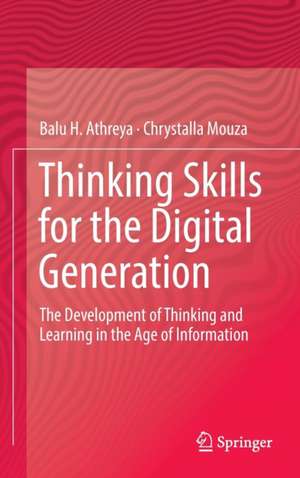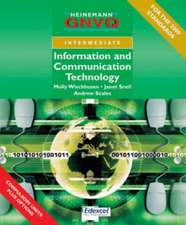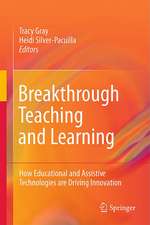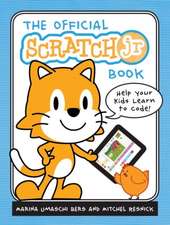Thinking Skills for the Digital Generation: The Development of Thinking and Learning in the Age of Information
Autor Balu H. Athreya, Chrystalla Mouzaen Limba Engleză Hardback – 6 ian 2017
This important text synthesizes the state of knowledge related to thinking and technology and provides strategies for helping young people cultivate thinking skills required to navigate the new digital landscape. The rise of technology has resulted in new ways of searching and communicating information among youth, often creating information “overload”. We do not know how the new technologies will affect the ways young people learn and think. There are plenty of warnings about the dangers of information technology, but there is also enormous potential for technology to aid human thinking, which this book explores from an open-minded perspective.
Coverage Includes:
- An up to date review of the literature on thinking skills in general, and in relation to technology.
- Practical guidelines for thinking with technology.
- A scholarly review of the characteristics of the digital generation.
- A discussion of the various steps involved in the thinking process.
- A historical context of the Information Age and the transition from oral history, to printing press, to the Internet.
Thinking Skills for the Digital Generation: The Development of Thinking and Learning in the Age of Information is an invaluable reference for educators and research professionals particularly interested in educational technology, and improving thinking and problem-solving skills.
| Toate formatele și edițiile | Preț | Express |
|---|---|---|
| Paperback (1) | 579.02 lei 43-57 zile | |
| Springer International Publishing – 12 iul 2018 | 579.02 lei 43-57 zile | |
| Hardback (1) | 585.26 lei 43-57 zile | |
| Springer International Publishing – 6 ian 2017 | 585.26 lei 43-57 zile |
Preț: 585.26 lei
Preț vechi: 688.54 lei
-15% Nou
Puncte Express: 878
Preț estimativ în valută:
111.99€ • 117.22$ • 93.21£
111.99€ • 117.22$ • 93.21£
Carte tipărită la comandă
Livrare economică 31 martie-14 aprilie
Preluare comenzi: 021 569.72.76
Specificații
ISBN-13: 9783319123639
ISBN-10: 3319123637
Pagini: 300
Ilustrații: XIV, 179 p. 9 illus., 7 illus. in color.
Dimensiuni: 155 x 235 x 19 mm
Greutate: 0.45 kg
Ediția:1st ed. 2017
Editura: Springer International Publishing
Colecția Springer
Locul publicării:Cham, Switzerland
ISBN-10: 3319123637
Pagini: 300
Ilustrații: XIV, 179 p. 9 illus., 7 illus. in color.
Dimensiuni: 155 x 235 x 19 mm
Greutate: 0.45 kg
Ediția:1st ed. 2017
Editura: Springer International Publishing
Colecția Springer
Locul publicării:Cham, Switzerland
Public țintă
ResearchCuprins
Introduction.- The Digital Generation.- What is Thinking?.- The Thinking Process.- Sources of Information for Thinking.- Internet and Thinking.- Sources of Errors in Thinking and How to Avoid Them.- Strategies and Tools for Learning to Think.- Summary and Future Directions.-
Notă biografică
Balu Athreya an emeritus professor of Pediatrics (University of Pennsylvania and Thomas Jefferson University) has been a life-long learner and educator. His interest in diagnostic logic, communication with children and parents, intricacies of decision making for medical management, and languages stimulated and maintained his attention on thinking in general. Dr. Athreya has published widely. He is the author of Pediatric Physical Diagnosis and Handbook of Clinical Skills: A Practical Manual.
Chrystalla Mouza is an Associate Professor of Instructional Technology in the School of Education at the University of Delaware. She earned an Ed.D., M.Ed, and M.A. in Instructional Technology and Media from Teachers College, Columbia University and completed post-doctoral work at the Educational Testing Service (ETS). Her research investigates teacher learning with regard to technology, applications of technology in K-12 classrooms, and teaching and learning outcomes in ubiquitous computing environments. Her work has been supported by the National Science Foundation, the Delaware Department of Education through the Higher Education Component of No Child Left Behind, and ETS. Dr. Mouza is the recipient of the 2010 Distinguished Research in Teacher Education Award from the Association of Teacher Educators and former Chair of the AERA Special Interest Group, Advanced Technologies for Learning. She serves on the editorial board of the Journal of Technology and Teacher Education and provides editorial assistance to numerous journals, conferences, and book publications including the Journal of the Learning Sciences, the Annual Conference of the American Educational Research Association, and the Research Highlights in Technology and Teacher Education book series.
Textul de pe ultima copertă
This important text synthesizes the state of knowledge related to thinking and technology and provides strategies for helping young people cultivate thinking skills required to navigate the new digital landscape. The rise of technology has resulted in new ways of searching and communicating information among youth, often creating information “overload”. We do not know how the new technologies will affect the ways young people learn and think. There are plenty of warnings about the dangers of information technology, but there is also enormous potential for technology to aid human thinking, which this book explores from an open-minded perspective.
Coverage Includes:
- An up to date review of the literature on thinking skills in general, and in relation to technology.
- Practical guidelines for thinking with technology.
- A scholarly review of the characteristics of the digital generation.
- A discussion of the various steps involved in the thinking process.
- A historical context of the Information Age and the transition from oral history, to printing press, to the Internet.
Thinking Skills for the Digital Generation: The Development of Thinking and Learning in the Age of Information is an invaluable reference for educators and research professionals particularly interested in educational technology, and improving thinking and problem-solving skills.
Caracteristici
Includes practical guidelines for coping with technology and using technology to expand thinking Provides a comprehensive perspective that is relevant to all professionals working and interacting with young learners Presents a scholarly review of what we know about thinking, learning, and electronic media







